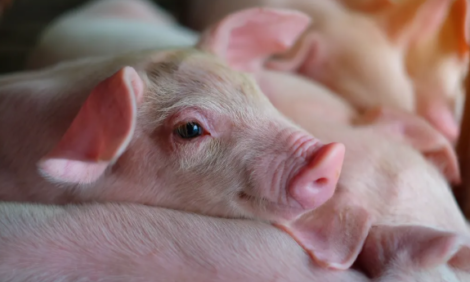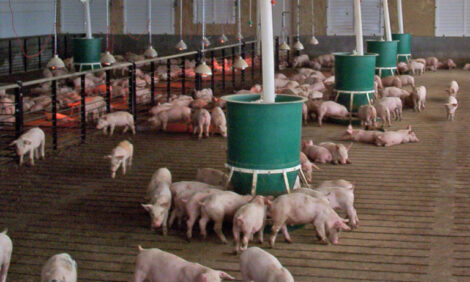



Reasons to be thoughtful: The impact of FMD on the UK Pig Industry
By Dr John Strak - This month’s Strak report focus' on how the foot and mouth epidemic will affect Britain’s pig producers. It’s an important question which he states the UK Pig Industry needs to reflect on.|
Dr John Strak

Dr Strak's views on the UK and global pig markets are produced in Whole Hog every fortnight. For more details click the link at the foot of the article. |
First, let's be clear that the direct impact of FMD on pig numbers has been minimal. As I write this in the third week of March, little more than 1% of the animals slaughtered because of FMD are pigs and it's evident that the biosecurity measures taken by the UK pig sector have, by and large, been successful at preventing the disease spreading through the pig industry.
That's a positive note to start with. However, the market impact of the UK losing its FMD- free status is not so positive. In fact, everyone I have spoken to is clear that it is rather negative and very confusing.
There is an immediate impact on the prices paid for pigs through the loss of export markets for key parts of the carcass (shoulders, flanks and the cheaper cuts) and from the complete shutdown in international trade in cull sows.
The "normal" export volume of pigmeat from the UK is of the order of 170-200,000 tonnes per year - or nearly 20% of the total pigmeat produced - so it's a major market disturbance to lose this. There have also been higher costs arising from feeding stock that would normally have left units and from the increased hassle involved in complying with the licensed movement to slaughter scheme. The down ward pressure on prices from lost markets and the increased feeding costs on the farm generate the double whammy that many farmers will recognise and that their bank managers will have nightmares about.
However, these negative effects may be countered by some positive ones. The Dutch, Irish and French FMD outbreaks have caused their exports of pigmeat to be curtailed and this loss of potential imports will tend to support the UK's domestic pig price (see my accompanying chart).
However, this effect is complicated by various trade bans on EU- produced pigmeat (North America, Japan, etc) and, in the short term, there will be more than 700,000 tonnes of pigmeat that is normally exported from the EU that is looking for a home inside the EU (that's not including the Dutch and French output).

This last point implies serious dislocation of the global pigmeat trade with upward price pressure on meat that can enter the world market and more price volatility everywhere (I think I've made this point about increasing price volatility before!). Furthermore, if Dutch, French and Irish pigmeat is stored until a later date there will be a corresponding negative price pressure on the trade at some point in the future (more volatility again).
My guess is that the positive pressures will balance the the negative ones in the short term providing that the UK pigmeat supply chain continues to operate throughout the UK's FMD epidemic and that there is some serious lateral thinking about what to do with all those shoulders and flanks. Another key factor will be the ability of the Danes to stop FMD at their borders and to get their pigmeat moving on to the world market again - so let's hope that the EU's trading partners accept that the EU has got FMD under control. British and Danish producers should be at one with this objective. The unanticipated culling of sheep and cattle in the UK will also firm the market for pigmeat in the medium term as alternative protein supplies are affected.
So these are reasons to be cheerful. Pig farmers' profits, of course, will depend on how all those cull sows are dealt with, UK farmers will be watching to see how the Dutch and Irish governments deal with this issue if their pig producers suffer serious livestock movement and meat export constraints because of FMD.
But in all of this the week to week movement in pig prices in Britain could be very great as the marketplace tries to make sense of a very disturbed pig and pig carcass trade. There isn't any crystal ball that I know of that can help you with this but I would repeat that farmers would especially benefit in times like these from a "virtual clearing room" for pig prices. The need for transparency and techniques to deal with price risk has never been greater.
Looking at the bigger picture the MAFF's handling of the FMD epidemic has not been covered in glory. In 1967 it's said that the MAFF was close to introducing vaccination as a way of halting the FMD outbreak in that year. Now MAFF have admitted that this outbreak is worse than 1967 (they could hardly deny it) and there are powerful voices suggesting that vaccination should be used to halt the spread of FMD.
Indeed, by the time you read this I suspect that the decision will be taken out of MAFF's hands and this U turn will have happened.
Those voices have been quick to point out that farming is no longer the principal income earner in the rural areas and that meat exporting is not vital to the national economy. It's claimed that the loss of meat exports as a consequence of a vaccination policy would achieve other aims; like the end of live animal exports, more organic and traditional farms, lower livestock densities and positive environmental effects, higher animal welfare, etc.
All these arguments raise the spectre that this FMD epidemic may have marked a watershed and people and politicians may not think about farming and farmers in the same way again.
If tourism and protecting the environment are to be the key activities of farmers/rural dwellers the powers-that-be may well say that it's logical to accept that FMD vaccination would be a useful catalyst for downsizing UK livestock farming and making it easier/cheaper for Government/consumers to order their priorities.
Things have moved on from when vaccination policy for FMD was determined by the UK/EU in the last decade - and farmers shouldn't assume that the last word has been said on this. Equally we must accept that the thinking on how to respond to these arguments is an urgent priority for all those with an economic stake in pig production.
Pig farmers and the pig industry have already been victims of lax biosecurity in the UK's international meat trade, and the archaic production and marketing practices of the UK's sheep trade. It's in the pig industry's interests to lead the thinking process because it may also be a victim of any change in vaccination policy and associated disease insurance and prevention policies. Clearly, the disruption to specific companies and suppliers will be huge as the animal health implications of losing FMD-free status kick in.
And remember, as far as British pig farmers are concerned, there are few mechanisms around for them to get their piece of the tourism/environment/traditional farming "cake".
Moreover, they (and the allied industries) have much more capital equipment and investment at stake if the meat/genetics exporting business is to be disregarded or downgraded in importance. Could you sell tickets to rural tourists who want to visit an abandoned pig abattoir or nucleus breeding unit?.
Contrast this with sheep farmers sitting atop their green and friendly hills who could easily see their incomes rise if policies to reduce stock numbers and attract tourists to their area were successful. The same can't be said for pig farmers or pig industry employees. These are reasons to be thoughtful.








